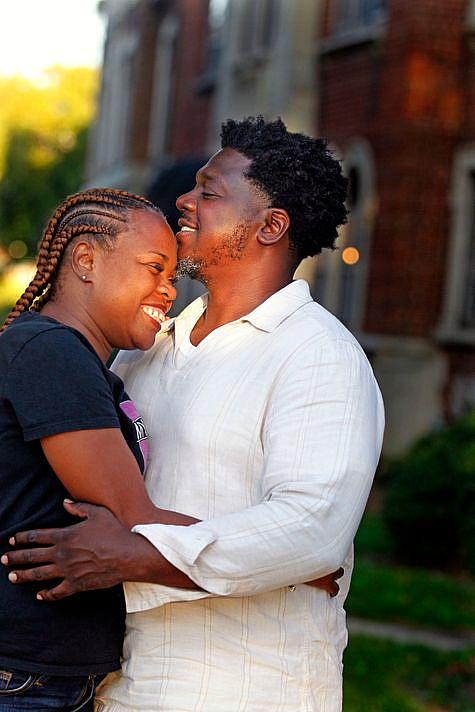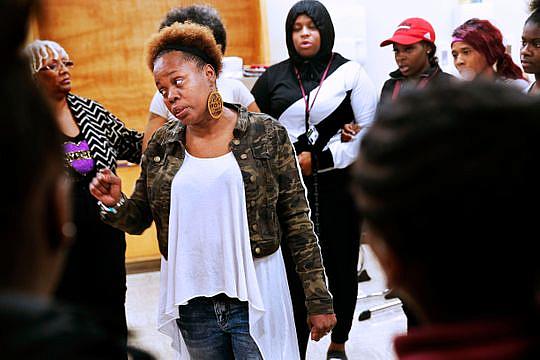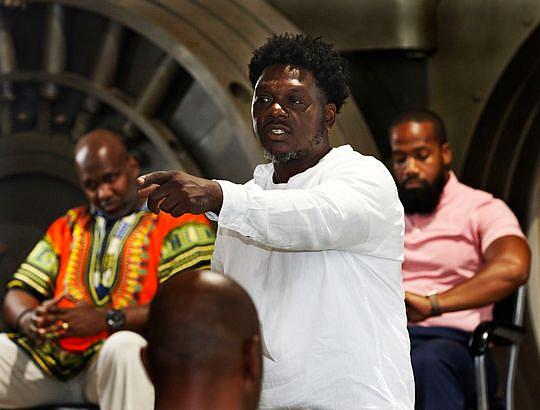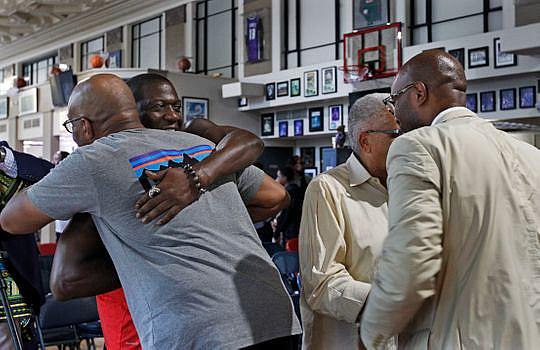Milwaukee couple make it their mission to give trauma victims the chance to talk and be heard
James E. Causey’s reporting on this project was completed with the support of a USC Annenberg Center for Health Journalism grant.
Other stories in this series include:
I returned to the 53206 neighborhood — and saw some boys turn into men
Want to get involved in a community garden? It's not all weed-pulling.
How a Milwaukee community garden helped turn a struggling boy into 'Lil Obama'
A reporter shares lessons from a Milwaukee garden trying to save at-risk boys
In Milwaukee's poorest ZIP code, fruits and vegetables become powerful weapons for saving young boys

Tina and Kwabena Nixon work with teen girls and boys in their workshops “Real Talk" and “My Sista’s KeepHer.”
(Photo Credit: Milwaukee Journal Sentinel)
The truth is, spoken word artists Tina Nixon and Kwabena Antoine Nixon have helped people enveloped in trauma open up about their innermost fears.
They've done it by voicing their own truths and creating safe environments for youth and adults alike to let down their guard.
Their tools: spoken word, art and writing exercises.
The Nixons are neither counselors nor therapists, but their credibility is rooted in the trauma each experienced growing up, and the resiliency they have shown in not only surviving but thriving.
They receive funding through Milwaukee Public Schools; grants from the city; and a range of speaking engagements from churches, weddings and even funerals. Kwabena Nixon has spoken in prisons; at colleges and universities; and on the stage of the Democratic National Convention. He is also the author of two books: "Eye Write What Eye See" and "Sensitive Warsongz".
Both say their mission is to give people the chance to talk and be heard, something they were not afforded growing up in Chicago. Tina Nixon works with girls and women; Kwabena Nixon works with boys and men.
“I’m a stranger to them, but when I share my story and I tell my truth, they understand me, and it opens the door for them to share,” said Tina Nixon, founder of “My Sista’s KeepHer,” which teaches participants to love and accept themselves through self-expression and writing.
* * *
During the first week of the school year, Tina Nixon and her team of poets and volunteers greeted 24 girls selected to participate in an eight-week workshop at Milwaukee Vincent High School.
The girls — mostly freshmen — were selected by school administrators to participate. When they came into the workshop they were invited to sit in a circle, so everyone could see each other. Nixon stepped into the middle, telling the girls they will not be graded, but she wants them to participate.
There were only two rules: Respect your classmates, and what is shared in the classroom stays in the classroom.
When the girls agreed, Nixon asked:
“How many of you live in the home with both your biological mother and father?”
Four girls raised their hands.
“How many of you don’t know your father?
More than half the girls raised their hands.
“How many of you have been touched inappropriately?”
More than 70 percent of the girls raised their hands.
Tina Nixon gathers students and adults together in a circle. (Photo: Angela Peterson/Milwaukee Journal Sentinel)
Nixon began to recite her poem “What Kept Me,” where she talks about her childhood. She described being sexually abused at 7; her mother dying when she was 9; becoming a mom at 18; and being in an abusive marriage.
“My truths made me who I am today, but my love of writing and poetry helped me to heal,” she said. “I’m here today to listen to you and hopefully help you.”
One student told Nixon that the poem touched her and made her want to cry. Nixon told her it’s OK to cry because tears are the shower that cleanses the soul.
Nixon asked the girls to take out some paper and write out their truths, starting each sentence with “The truth is” and filling in the blank.
There are no wrong answers, she said.
“Don’t worry about sentence structure. I just want you to write until I tell you to stop,” she said. Ten minutes into the exercise, a few girls started to cry.
“If you start to feel emotional, then you are exactly where you are supposed to be,” she said. “Keep writing. Remember, you can’t heal what you can’t acknowledge.”
* * *
Toilisa Lockett, freshman principal at Vincent, said Tina Nixon’s workshop is one of many resources that the school uses to help young people deal with difficult issues.
“We know that our kids are exposed to far too much and they have a hard time talking about it. Sometimes they never talk about it and it affects their health and minds,” Lockett said.
Programs like “My Sista’s KeepHer” fill a void because students may feel more comfortable talking with poets than with teachers or administrators about certain experiences.
Maybe the issue is living in a violent neighborhood. Having a parent incarcerated. Hearing gunshots all night. Being homeless. Having the utilities shut off. Seeing a parent physically or mentally abused.
“What we fail to realize is that our kids absorb the tragedies around them,” Lockett said. “They may not verbalize it, but it comes out in their actions.”
Kids’ grades may suffer. They fall asleep in class. They appear agitated or ready to fight. Or they feel hopeless, she said.
By age 16, two-thirds of the children in the United States have experienced a traumatic event, according to a 2018 study. One in four youths between the ages of 10 and 17 had witnessed family or community violence in the past year, according to the National Survey of Children’s Exposure to Violence.
In many Milwaukee neighborhoods, the percentage of young people exposed to violence is much higher, according to Lockett.
When Nixon asked the girls at Vincent, they said:
“The truth is I fear for my safety and the safety of my brother.”
“The truth is we’re homeless.”
“The truth is I don’t know my father.”
“The truth is I saw my uncle get shot.”
“The truth is I tried to commit suicide.”
Nixon doesn’t claim she can heal children of their traumatic experiences, but she gives words of encouragement and a nonjudgmental attitude. She listens intently. She tells them that they will be all right. She has been where they are.
“I see myself in each of them,” she said. “The only difference is that I didn’t really have anyone to turn to. I try to give them what I didn’t have growing up.”
Nixon listens without criticizing.
“Listening is a very powerful tool because most of the time we just want to be heard and know that we matter,” she said.
But sometimes, Nixon is taken aback by what she hears.
At the end of the 90-minute session, a girl who had been quiet the entire time finally raised her hand.
“What is your truth?” Nixon asked her.
The girl took a deep breath, looked at the words on her paper and read them to the group.
“The truth is I was molested by my mother’s boyfriend and he went to jail for it.”
“The truth is my mother asked me if he can move back in with us.”
“The truth is since he’s been living with us I haven’t been able to sleep because I’m scared that he’s going to do something to my sister.”
“The truth is I don’t know what I’m going to do.”
After the bell sounded, Nixon embraced the girl as tears rolled down both their faces.
The Nixons are not mandated reporters, so they are not required to report cases of suspected child abuse or neglect, but they can encourage people to talk to a social worker or authorities.
Two weeks later, Kwabena Antoine Nixon emceed an event called “Real Talk” at Gee’s Clippers barbershop. About 80 black men gathered to talk about issues affecting them.
Before the men delved into topics of employment, crime and relationships, he told them they can’t address anything else in their lives until they understand themselves.
He asked the men to write their truths on a piece of paper or type out notes on their cell phones.
“I just need you to write: The truth is ... and fill in the blank,” he said, echoing his wife’s instructions to the high school girls. “Trust me, this may be the deepest thing that you will ever do.”
Nixon, 49, co-founded the organization “Flood the Hood with Dreams” and the “I Will Not Die Young Campaign" with fellow spoken word artist Muhibb Dyer. The two wanted to tackle the issues of trauma and change the conversation about black boys and men becoming negative statistics in Milwaukee.
His “Real Talk” conversations are a new initiative aimed at providing a platform where African-American men can talk about all types of issues.
After giving the men time to write, he asked for volunteers to share.
A few older men went first.
“The truth is I don’t think I will ever be the man my father was.”
“The truth is I’m worried that my wife’s cancer will kill her."
“The truth is I’ve been avoiding doctor checkups because I fear what they can find in me.”
After every truth, Nixon instructed the men to give each other a hand for sharing.
He then scanned the room and asked for a young person to volunteer.
A man in his 20s stood up. He was shaking.
Nixon stood next to him to hold him steady. “I got you,” Nixon said. “Let it out.”
“The truth is I wish I could see my kid.”
“The truth is I feel homicidal.”
Nixon asked the others to surround the man. About a dozen men placed their hands on him as he shared more and cried.
“The truth is I feel like nobody wants to see me doing good. The truth is I’m a powerful man.”
“The truth is I wish my dead friends and family were still here with me.”
The group applauded the man and hugged him.
Nixon told the group to re-read their truths to themselves.
“That’s you,” he said. “Everything that you are running from is right there in front of you. Look at it. If it’s something you need to fix, now you know what you need to address.”
Kwabena Nixon moderates "Real Talk" sessions at Gee's Clippers in Milwaukee. (Photo: Angela Peterson/Milwaukee Journal Sentinel)
Kwabena said he started his form of counseling for three reasons.
- He wanted to give people what he didn’t get growing up.
- He wanted to change the narrative about what goes on in urban communities. “People need to know that good things come from the areas we come from,” he said.
- He wanted to show young men what is possible.
Nixon discovered as a child that when he wrote about what he saw — the good and bad — it gave him the power to rise above anything holding him back, including the low expectations people had for him.
When he was 11, he wrote and read a poem at his father's funeral.
When he was in high school, a teacher told him if he kept hanging out with a bad crowd that he would end up on the cover of an obituary.
"That stuck with me for a long time," he said. "It was true at the time, but I wanted to tell the story of my friends and family, so I proved it wrong and ended up on the cover of both of my own books."
Nixon went to Marshall High School on the west side of Chicago. Growing up, kids who went there were considered underdogs who were destined to fail.
During his senior year, a school counselor tried to steer him toward a trade school instead of a four-year college.
“We were the throwaway kids,” Nixon said. “We weren’t given a fair shot.”
"We all knew someone who may have been incarcerated or shot, maybe even murdered," Nixon said.
The same is true for many of the African-American boys he counsels today. They appear to be more numb to violence than his generation, and that troubles him.
When they talk about death, there’s no shock. It’s matter-of-fact.
“I hear this all the time. ‘You know such and such got shot last night,' ” Nixon said. “And the other kid will say, ‘For real, that’s messed up.’ And they keep moving on.”
When Nixon was a kid, if a tragedy occurred, the stability of the neighborhood, where everyone knew each other, helped children recover.
That’s no longer true today.
* * *
Kwabena Nixon said the inspiration for the "I Will Not Die Young Campaign" came in 2013, when he was speaking at the Boys & Girls Club with fellow poet Muhibb Dyer. The men asked those gathered what they wanted to be when they grew up.
One man said he wanted to be a doctor. Another a lawyer. Then a young man with braids in his hair said, “I don’t want to die young.” That statement became the title of the new campaign.
Nixon and Dyer, whom he first met on the poetry circuit in Milwaukee in 1997, made it their goal to keep young people safe by building up their self-esteem through writing and poetry.
Nixon keeps doing what he does because writing and poetry saved his life, marriage and soul.
While he knows his workshops are making a difference, he knows not everyone can be saved.
Sometimes when he opens a classroom door, he finds chaos.
“Imagine a bunch of 14- to 17-year-olds not paying attention. Some are cracking jokes. Some don’t want to be there,” he said.
Nixon slices through the disorder in a shocking way.
He drops a bunch of obituaries on the floor and tells the kids, “This is what we are up against.”
The room invariably gets quiet.
“I tell them to put their mom in their minds for a moment because no matter how rough you are, everyone cares about a mother, an auntie or their grandmother,” he said.
Nixon then describes to them what it would be like for their loved ones to get a phone call saying, “We just found your son dead.”
Nixon may ask who has lost a family member or friend to violence or who is being raised in a single-parent household and 90 percent of the hands go up for each question.
Then he begins to recite his poem "If This Be Ma Last Words" loud and aggressive.
"If this be ma last words
If this be all that I've said
If this be the last words read
then listen to me. Remember me.
Remember me with smiles,
celebrate me, venerate me with a million children holding incense.
Dress them in liberation blood red for Malcolm.
Place black kufis on their natural heads, and make sure they stand barefooted on the green earth.
Send 143,999 white doves into the atmosphere and ask them to save a place for me ..."
When Nixon finishes, he tells them that he's fighting for them, but they have to want it as well.
He then shares his story of growing up in poverty and losing his father to gun violence.
When Nixon asks young men to share their stories, often the toughest kids break down.
They have been holding so much in and it finally gives them a chance to let it out and be boys again.
Men participating in "Real Talk" discuss issues such as being better fathers, husbands and mentors. (Photo: Angela Peterson/Milwaukee Journal Sentinel)
Tina and Kwabena Nixon met during a poetry slam in Milwaukee at the former Emerald City nightclub.
Tina Nixon was going through a divorce. Her marriage failed because of her husband’s drug use and his physical and mental abuse. When he would get upset with her, he would throw her books out, because he knew how much she loved them.
She was on a blind date when Kwabena walked up to her table and introduced himself to her and asked her for her number and said he would love to discuss poetry over coffee or tea.
A few days later, he called and invited Tina and her friends over to his place to play spades with some of his friends. She remembers seeing his wide-ranging book and jazz collection.
“I will never forget, he played Billie Holiday for me and I love Billie Holiday,” she said.
The two would later discover they had even more in common. They each lost a parent at a young age. Tina was 9 when her mother died of tuberculosis. Kwabena was 11 when his father was shot and killed.
They both felt there was no one to talk to them when they went through traumatic events.
And they both believed in the healing nature of poetry and writing.
The couple got married on Aug. 11, 2007, at the Tripoli Shrine Center. Their vows were poems. His poem was "I'm Ready." Her poem was "Go Deeper."
In 2013, Kwabena told his wife that girls needed just as much attention as boys, and he encouraged her to start a program to address their needs.
“I didn’t think I could do it at first,” Tina Nixon said. “But he just told me to use my voice and I did. I’m glad I did.”
Dealing with trauma can be hard on those who do the healing. To cope, the Nixons agree to not bring their work home.
“We have to be able to step away from it and come back at it fresh,” Tina said.
Kwabena said the most important truth that he shows everyone he talks to is: "You have always had the power. You just needed a reason to show it."
[This story was originally published by Journal Sentinel.]

